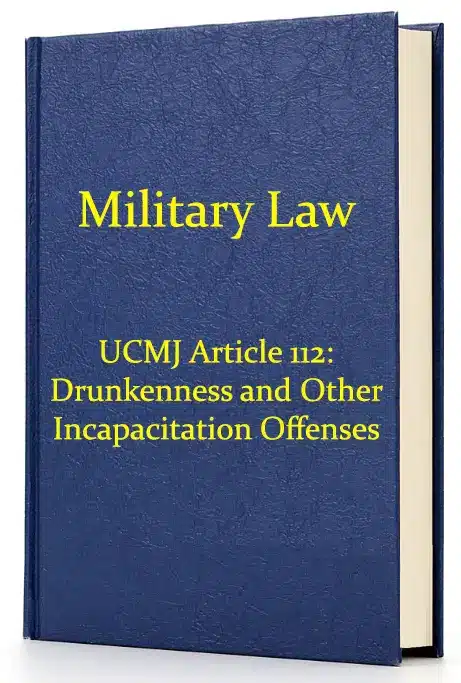The MCM specifies under Article 112 that any service member may be subject to prosecution if they are drunk on duty, are incapacitated for the proper performance of their duty, due to an indulgence in an alcoholic beverage or any drug, or are drunk while they are a prisoner.
In order to be prosecuted for being drunk on duty, the prosecution must demonstrate:
-
the accused was on a specific duty; and
-
the accused was drunk while on this duty.
Incapacitation for duty from drunkenness or drug use conviction requires the prosecution to prove the following:
-
the accused had specific duties to perform;
-
the accused was incapacitated for the proper performance of such duties and
-
such incapacitation was the result of previous indulgence in intoxicating liquor or any drug.
A conviction for a drunk prisoner requires proof that:
-
the accused was a prisoner, and
-
while in such status, the accused was drunk.
Understanding Article 112 (Drunkenness and Other Incapacitation Offenses) of the UCMJ
Drunk on duty refers to a state of alcohol intoxication that sufficiently impairs the service member from fulfilling their responsibilities with rational and complete exercise of their mental or physical faculties. This charge applies only if the accused was on duty during the transgression.
Incapacitation for duty from drunkenness or drug use refers to the accused being unfit or unable to perform their assigned duties as a result of alcohol consumption or drug use.
Maximum Possible Punishment for Violations of Article 112
Service members convicted of violating Article 112 face various punishments depending upon the specific charge.
Those convicted of drunk on duty face the maximum possible punishment of a bad-conduct discharge, forfeiture of all pay and allowances, and confinement for nine months.
Suppose the service member is convicted of incapacitation for duty from drunkenness or drug use. In that case, the maximum possible punishment is confinement for three months and forfeiture of two-thirds of pay per month for three months.
A drunk prisoner conviction carries a sentence of confinement for three months and forfeiture of two-thirds pay per month for three months.
How do you defend against Article 112 Drunkenness and Other Incapacitation Offenses charges?
When facing the combined resources of the military andTo the current cultural climate, you need to be prepared to defend your career and your freedom. Crisp and Associates, LLC has a team of experienced trial attorneys who have won these cases. This team includes the firm’s founder, Jonathan Crisp, a highly respected former Army JAG with over 23 years of experience in military law and a sought-after speaker and lecturer on martial law. Donald Gordon has litigated cases before the Discharge Review Board, the Board for Correction of Military Records, and the Board for Correction of Naval Records regarding various matters and a diverse background of clients.
If you or someone you know is facing Article 112 charges for Drunkenness and Other Incapacitation Offenses, you need to speak with a Military defense attorney right away.


